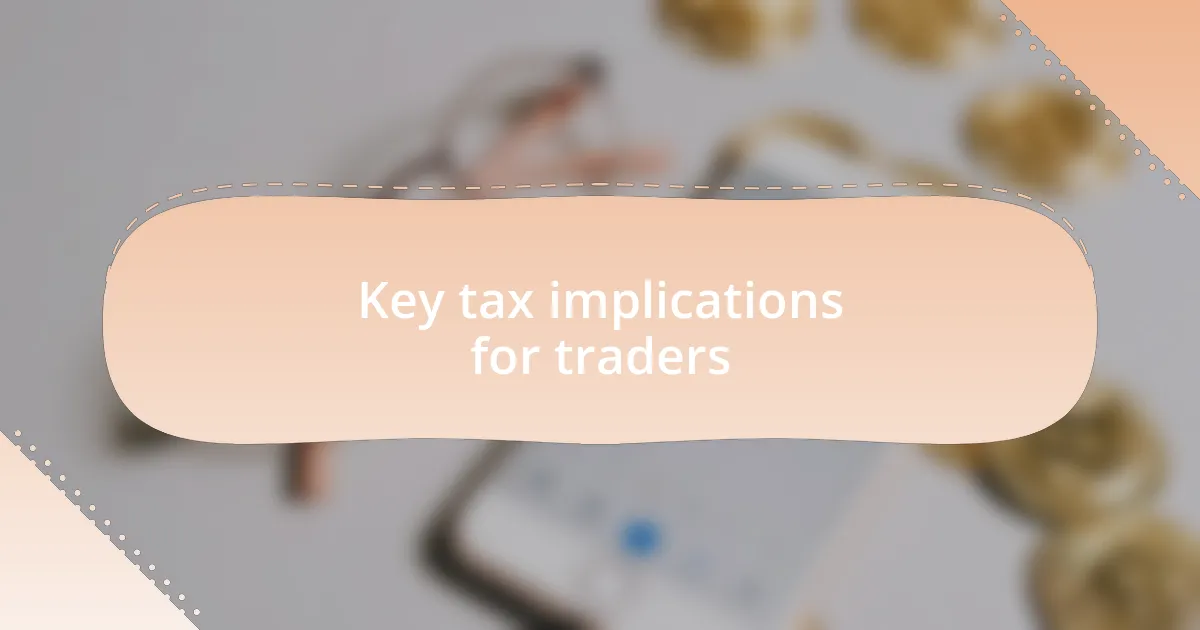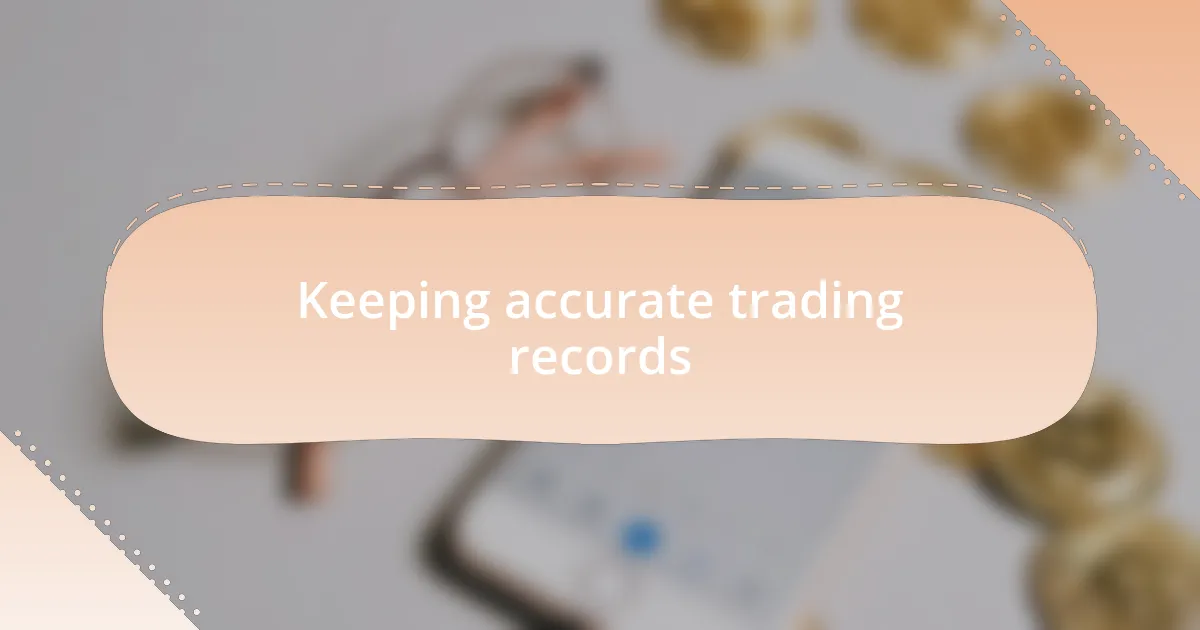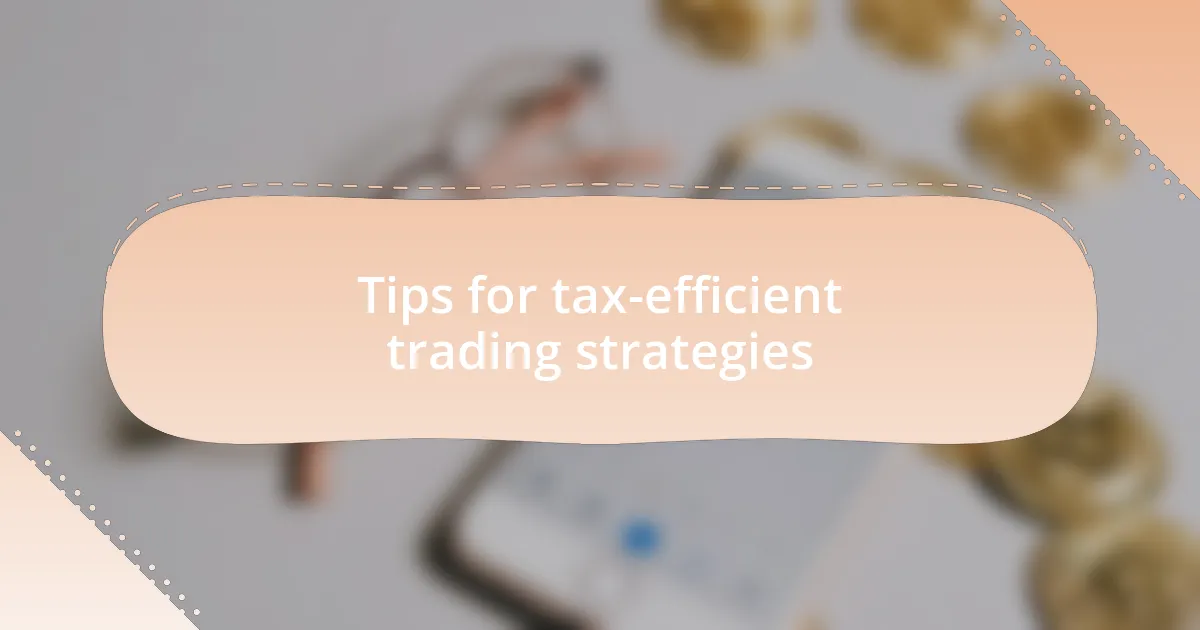Key takeaways:
- The IRS treats cryptocurrencies as property, making every trade a taxable event. Accurate record-keeping of trades is crucial.
- Distinction between short-term and long-term capital gains significantly impacts tax rates; holding assets for over a year can lower tax liabilities.
- Tax-loss harvesting can offset gains and reduce taxable income, and careful timing of trades can align with tax efficiency.
- Utilizing tax-advantaged accounts like self-directed IRAs can enhance trading benefits by deferring tax liabilities on profits.

Understanding cryptocurrency taxation
Understanding cryptocurrency taxation can be a bit daunting, and I remember the first time I faced it. The intricacies of capital gains tax, where I had to report my profits on trades, left me feeling overwhelmed. Have you experienced that confusion? It’s crucial to grasp that the IRS treats cryptocurrencies as property, making every trade a taxable event.
At one point, I found myself sifting through countless resources, unsure about how to accurately report my earnings. I was astonished to learn that even small transactions could lead to significant tax liabilities. It made me realize how essential it is to maintain meticulous records of every trade and to understand the holding period of my assets, as this directly impacts how much tax I owe.
I often hear traders asking if their long-term investments are capped at a specific tax rate. I can relate to that curiosity. It turns out that holding onto your crypto for over a year can lead to lower capital gains taxes, which was a game-changer for my trading strategy. Understanding these aspects not only helps in compliance but also can lead to considerable savings in taxes.

Key tax implications for traders
When it comes to trading, one key tax implication that I’ve encountered is the necessity of distinguishing between short-term and long-term capital gains. I vividly recall a time when I made several quick trades that, while profitable at first, ended up costing me more in taxes than I had anticipated. The IRS imposes a higher tax rate on short-term gains, which can feel like a punch to the gut when you realize that some of your profits are effectively gone. Have you ever made a trade that looked great on paper but left you disappointed come tax season?
Another important aspect that many traders overlook is the tax implications of crypto-to-crypto trades. I remember when I first ventured into trading different cryptocurrencies. I thought I was merely swapping one asset for another, but it didn’t dawn on me until later that each trade is treated as a taxable event. Understanding that each swap could trigger a potential tax liability helped me refine my trading strategy and prioritize those moves that would minimize my tax burden.
Lastly, the idea of loss harvesting has been a game-changer in my approach to trading. There have been instances where I had to accept certain losses, which felt devastating at the time. However, the realization that I could offset those losses against my gains brought a sense of relief. This strategy not only reduces overall tax liability but also reshapes how I view every trade, encouraging a more strategic and thoughtful approach. Have you considered how your losses could work in your favor come tax time?

How to report cryptocurrency gains
To report your cryptocurrency gains, it’s crucial to maintain detailed records of each transaction. I learned this the hard way after sifting through countless trades during tax season. Having a well-organized document that includes dates, amounts, and the nature of each transaction simplifies the reporting process immensely. How would you feel if you had to scramble to remember all your trades at tax time?
When I first began navigating the reporting forms, I was overwhelmed by the tax terminology. The IRS requires you to fill out Form 8949 to report sales and exchanges of capital assets, including cryptocurrencies. To streamline that process, I dedicated time to learn how each section applied to my trades, including short-term and long-term distinctions. Have you considered how familiarizing yourself with these forms can ease your stress?
It’s also important to remember that losses can work to your advantage. I once faced a series of trades that resulted in unexpected losses. Instead of viewing them purely as setbacks, I recognized the opportunity to report those losses and offset them against my gains. This revelation not only lessened my tax burden but also changed how I approached future trades with a more resilient mindset. How can finding the silver lining in losses transform your trading strategy?

Keeping accurate trading records
Maintaining accurate trading records is essential for any trader, and I’ve found that the effort pays off in unexpected ways. Early in my trading journey, I kept only minimal notes, assuming I could recall the details later. I quickly discovered how misleading that assumption was when I struggled to reconstruct my trades come tax season. Isn’t it exhausting to rely on memory when precision is so important?
In my experience, categorizing trades helps immensely. I developed a simple spreadsheet that divided transactions by date, asset type, and amounts. This organization not only simplified my reporting but also gave me insights into my trading patterns. Have you ever considered how a clearer picture of your trades could enhance your overall strategy?
I also learned to track not just profits but also the fees incurred during trades. I vividly recall a situation where I overlooked small transaction costs that added up significantly throughout the year. This mistake taught me that every detail counts. How might developing a comprehensive record-keeping practice change the way you approach your trading profits and losses?

My personal experiences with taxes
Navigating taxes as a trader has been quite the journey for me. I remember the first year I filed my taxes after diving deep into cryptocurrency trading. It felt overwhelming. As I sorted through my transactions, I realized I had never considered how my short-term trades would be taxed differently than my long-term holdings. Did you know that these distinctions can have a significant impact on your overall tax bill?
Tax time also brought a wave of anxiety when I discovered how easy it is to miscalculate gains. In one instance, I misreported a trade where I thought I had made a profit, only to find out after careful checking that it had resulted in a loss. This really hit home for me; it reminded me how crucial it is to stay diligent about understanding tax obligations. Have you ever had a moment where a small oversight had big consequences?
My experience with gathering tax documents taught me the importance of planning ahead. I’d procrastinated until the last minute, thinking I could just whip everything together quickly. However, I soon learned that having a solid tax strategy can change the game entirely. Reflecting on my past mistakes makes me wonder – are you proactive with your tax strategy, or do you find yourself scrambling as the deadline approaches?

Tips for tax-efficient trading strategies
One effective strategy for tax-efficient trading is to take advantage of tax-loss harvesting. I vividly recall a year when I had some trades that didn’t pan out. By strategically selling those positions at a loss, I was able to offset gains from other trades, which significantly reduced my taxable income. Have you ever considered the potential benefits of turning losses into tax advantages?
Another tactic that can be surprisingly beneficial is the timing of your trades. I remember intentionally holding onto some assets for a year or more to qualify for long-term capital gains rates, which are often significantly lower than short-term rates. This approach made me feel more in control of my tax situation, and it might prompt you to think: how can I align my trading strategy with tax goals?
Lastly, leveraging retirement accounts, like a self-directed IRA, can yield impressive tax benefits for traders. I’ve found it incredibly satisfying to trade within a tax-advantaged account, where my profits grow without immediate tax liability. This makes you wonder, have you explored how using these accounts could reshape your trading experience and tax implications?